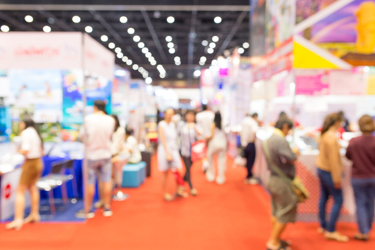Shaping The Future Of Microwave Technology In San Francisco

By John Oncea, Editor

IMS 2025 is fast approaching. Let’s take a look at the show one publication calls “the global epicenter of microwave innovation.”
San Francisco’s Moscone Center will transform into the global epicenter of microwave innovation from June 15–20, 2025, as it hosts the IEEE MTT-S International Microwave Symposium (IMS) 2025. This flagship event, organized by the IEEE Microwave Theory and Techniques Society (MTT-S), stands as the premier gathering for professionals, researchers, and industry leaders in microwave, RF, millimeter-wave, and terahertz technologies.
IMS 2025 promises an immersive experience for attendees, featuring a blend of technical sessions, hands-on workshops, interactive forums, and a bustling exhibition floor. The event’s mission is clear: to foster the exchange of innovative ideas, showcase the latest technological breakthroughs, and facilitate networking among the brightest minds in the field.
Technical Sessions: Exploring The Cutting Edge
The heart of IMS 2025 lies in its technical program, which offers a comprehensive look at the latest advances in the field. This year’s sessions cover a diverse range of topics, reflecting the interdisciplinary nature of microwave engineering:
- Biomedical Applications: Explore breakthroughs in medical imaging, diagnostics, and biosensors, including advances in magnetic resonance imaging, dielectric spectroscopy, and resonant microwave biosensors. These sessions highlight the intersection of engineering and medicine, aiming to improve patient outcomes and healthcare technology.
- Sub-THz and mm-Wave Phased Arrays: Discover innovations in phased array systems, such as 150GHz AiP modules, integrated GaN and Si beamformers, and novel body proximity detection techniques. These technologies are critical for next-generation wireless communication and sensing.
- Packaging and Integration: Learn about new approaches for packaging up to sub-THz frequencies, including low-loss shielded interconnects, 3D RF glass-interposer architectures, and waveguide launcher technologies for automotive radar. These advances enable higher performance and integration in compact form factors.
- Acoustic Wave Technologies: Sessions will delve into the design of low-loss SAW filters for Wi-Fi 7, lithium niobate acoustic filters, and high-frequency FBAR devices. These innovations are crucial for the future of wireless connectivity and signal processing.
- Advanced RF Components: Presentations will cover phase-shifting components with co-designed RF functionalities, including quasi-circulators, bandpass filters, and tunable attenuators implemented in various technologies such as CMOS and substrate integrated waveguides.
- Measurement Science: Joint IMS/ARFTG sessions will address the challenges of high-frequency and wide-bandwidth measurements, including traceability of coaxial standards, frequency extenders for mm-wave load pull, and enhancements in receivers and local oscillators.
- Compound Semiconductor Circuits: Explore the latest in mm-wave and THz amplifier technology, power amplifiers, digital predistortion, and highly integrated 300GHz active phased arrays for broadband and phased array applications.
- Receiver Front-End Innovations: Sessions will showcase advancements in low-noise amplifiers, phase shifters, and broadband receiver designs, pushing the boundaries of sensitivity and selectivity in RF systems.
A full list of technical sessions and their detailed descriptions can be found on the IMS technical program page.
Special Sessions And Tributes
IMS 2025 also will feature special sessions that honor the contributions of influential figures in the field. For example, a session will be dedicated to the memory of Al Katz, a pioneer in analog linearization, whose work has left a lasting impact on both academia and industry. This tribute will include personal recollections, an overview of his technical achievements, and discussions on state-of-the-art linearization technology.
Distinguished Lecturers And Speakers Bureau
The IEEE MTT-S supports a robust Speakers Bureau and Distinguished Microwave Lecturer (DML) program, offering attendees the chance to hear from world-class experts across a wide array of technical topics. These speakers, selected by the MTT-S Technical Committees, provide both in-person and virtual talks, ensuring global access to the latest knowledge and insights1. The Speakers Bureau covers everything from foundational microwave theory to emerging applications, with a full list of topics and speakers available on the MTT-S Speakers Bureau page.
Workshops, Forums, And Industry Exhibition
Beyond the technical sessions, IMS 2025 will offer:
- Hands-on Workshops: Interactive learning experiences led by industry and academic experts, covering practical skills and emerging technologies.
- Forums: Open discussions on hot topics such as 6G, quantum technologies, and sustainability in RF design.
- Exhibition: A showcase of the latest products, tools, and solutions from leading companies in the microwave and RF industry, providing attendees with the opportunity to see and assess new technologies firsthand.
Networking And Community Building
IMS 2025 in San Francisco stands as the world’s leading event for microwave professionals, offering a rich blend of keynotes, technical sessions, workshops, and networking opportunities. Whether you are a seasoned engineer, a researcher, or a newcomer to the field, IMS 2025 promises to inspire, educate, and connect you to the future of microwave technology through:
- Unparalleled Technical Depth: The most comprehensive program in microwave, RF, and millimeter-wave technology.
- Global Thought Leaders: Keynotes and lectures from the world’s foremost experts.
- Innovation Showcase: The latest products and solutions from top companies.
- Community: A unique opportunity to connect with the international microwave community.
IMS is as much about building connections as it is about technical content. Attendees can network with peers, engage with industry leaders, and participate in social events designed to foster collaboration and knowledge sharing.
